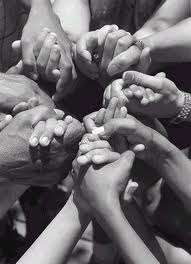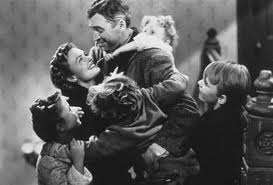What does it take to care in today’s world? I mean deeply care, for each other, for the planet, for our homes, for our belongings. More and more, it seems to me that everything is disposable, or undeserving of our time and effort. Instead of customer service with a real person, we get recorded messages and endless “phone lines.” Instead of taking time to attend to the details, we rush through our activities, feeling that “time is money.” Our belongings are accumulated and disposed of at whim, with no sense of care toward quality, beauty, artistry, or necessity. We even avoid difficult situations, preferring to let relationships become virtual, or disappear altogether so we don’t have to experience the pain of being present and caring.
I am struck with the memory of the movie “It’s a Wonderful Life” in which characters George Bailey and Mr. Potter are in stark contrast with one another. Most of us know the story. They are both bankers, but George knows his customers, establishes trust with them, cares about their well being and goes out of his way to help them. Mr. Potter, on the other hand, simply wants to have power and control, which he believes comes through financial wealth and owning as much as he can. George extends credit to needy customers, trusting that they will pay it back when they can. He helps them to move forward in life and looks out for others. When hard times come, Mr. Potter jumps at the chance to ruin George, creating a scenario which makes it appear as if George has been stealing from the bank. George, in his desperation, asks Mr. Potter for help, only to be laughed at, and realizes that his life insurance policy shows that he’s “worth more dead than alive.” Really? What measure of worth would ever say that a human life is worth more dead than alive? Yet, we live in a society that is communicating this message regularly. A simple paper that says so drives George to attempt suicide, only to have his angel step in and thwart the plan. Thank God for our angels!!

George is given the gift of seeing what his life would have been like had he never been born. He begins to see the many ways he has served his fellow human being through his care. He is shown things he didn’t even realize had touched people. He is then also shown what the town he lived in would have been like without him, a town filled with materialism, sex, saloons, all owned by Mr. Potter. Worst of all, the townspeople seem to have no interest in one another. They go about their lives by day in a state of sleep, drinking their sorrows away by night. George is given a new appreciation for his life and insists on returning to face whatever trials are before him. In the end, he discovers that all of those many community members he had helped over the years are eager to help him. The money is recovered and goodness prevails.

I would like to offer the idea that if we allow ourselves to care, we tap in to gratitude. With care, we also begin to connect with a higher purpose for our life and the lives of others. We see people, our towns, our homes, and our belongings in a different light, a Divine light. We have a deeper compassion for others. With care, we take time. We make time for our loved ones, take time to care for our homes and belongings, make time to creatively nurture ourselves and the planet, and allow time for our emotions. So why do so many of us numb ourselves to care? Why is it so easy to fall in to that state of daily sleep, and then wallow in our discontent by night?
Inevitably, with care comes pain. If we allow ourselves to feel gratitude for things, then it hurts more when we lose them. If we connect to a higher purpose for our life, we might have to face the fact that we are not living it, and struggle through the unknown of getting on purpose. If we care too much, others might take advantage of us. If we develop compassion for all of life, then we can feel the pain of others and don’t know what to do with it. If we take too much time to care, we might lose money, lose friends, lose our momentum. If we allow time for our emotions, we might lose ourselves to them and never snap out of them. It seems to me in this list that when we care, the risk of loss feels greater. Interestingly, I don’t think that the incidence of loss is any greater. Only the pain of the loss becomes greater. We are a society who wants the quick fix and the magic pill. We don’t want to experience pain, and care can mean pain.
I can’t help but to consider the cost of numbing ourselves to caring. Depression is running rampant in the United States, and growing around the world. Repeatedly, I see people rushing here and there with no sense of purpose and certainly no sense of satisfaction in their life. There’s always one more thing to do, one more place to go, one more reason they can’t take time, or one more reason they can’t allow themselves to care. We have more virtual relationships than real relationships. What has happened to us? How can we develop the courage to care? What is it in us that can’t face the pain that comes with care? What can help us to be vulnerable enough to take time to care?

I certainly don’t know the answers to these questions, but I do know that in my own life, what sustains me in my care is my community. When I am hurting or struggling because I’ve opened myself up to care, inevitably, someone steps in to support me in some way. Now, that said, I didn’t get to this point without asking for that support. Asking in itself puts us in a vulnerable position. We feel we might be seen as weak if we ask for help, or that we might burden others. We worry that we can’t “pay back” the support that we receive. We fear others may resent us for needing their help. The reasons we don’t ask for help are endless, and without asking for help, we don’t open the door for others to care. When we can be vulnerable, others are often more willing to be vulnerable with us and we then receive an opportunity to care for our community as they care for us. The caring perpetuates itself.
What I’ve come to realize is that when I have allowed people to help me, they feel a sense of purpose and joy that I would be denying them if I didn’t ask for and/or accept help. I know how wonderful it feels to me when I help another, as I’m sure you do too. We recognize that sensation of knowing we have made a difference in someone’s life. Who are we to deny that of another? As I’ve allowed myself to be more vulnerable, I have discovered the amazing community I am a part of, and feel a sense of connection that was absent before.

In today’s culture, it’s difficult to move to a “culture of care” when so many other influences tell us we need to make money, save time, be independent, do more, etc. I challenge you to tune in to your care. What do you care about? Who can you care for? Can you do it without allowing those other influences to shadow how you care for someone or something? Can you allow yourself to care from the heart, with nothing but love as the driver? What care do you need, and can you ask for it? Can you have the courage to feel the pain of caring, and know that your soul will grow stronger with every moment your heart is open? May we all have the courage to face whatever trials are set before us as a result of opening our hearts to care.
